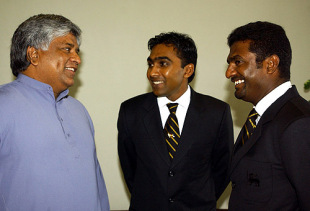The dissolution of Sri Lanka Cricket's interim administration under Arjuna Ranatunga was widely expected following a constant difference of opinion between the former World Cup-winning captain and the sports minister, Gamini Lokuge. The decision comes in the backdrop of a tumultuous year that featured more controversies than cricket.
The situation, which was constantly deteriorating, eventually came to a head after Ranatunga decided to sack 16 employees of Sri Lanka Cricket last week. The aggrieved employees approached the Minister, who ordered that no decision should be taken without first consulting him.
Ranatunga was appointed to the post in January 2008 after former chairman Jayantha Dharmadasa decided to step down. Ranatunga said then that he was taking over to set things right in cricket but he leaves having done more wrong than right.
Ranatunga tried to run Sri Lanka Cricket in the same autocratic and ad hoc way he captained the cricket team. But the circumstances are different, and what worked for him as captain has clearly backfired in his term as administrator. He has come across as obstinate and impulsive, and his refusal to involve his committee members in the decision-making process has earned him constant criticism. Worse, most of his decisions have turned out to be counter-productive.
Incredibly for a player-administrator, he has managed to alienate the majority of Sri Lanka's international players. The relationship, already rocky, virtually broke down when he unilaterally committed Sri Lanka to a tour of England in April-May 2009 despite being fully aware that a majority of the Sri Lankan players were contracted to play in the IPL in the same period. The England tour was not part of the ICC's Future Tours Programme but hastily organised to fill a gap in the English summer that arose due to Zimbabwe's withdrawal.
Ranatunga justified his decision saying that the cash-strapped Sri Lankan board badly needed the US$2 million guarantee money the tour would bring. But the tour fell through when the sports minister sided with the players.
Ironically, Ranatunga, who began his tenure by appealing to the Indian cricket board to bail out Sri Lanka Cricket, is now seen as the biggest obstacle in the relationship between the two boards. The Indian administrators haven't taken kindly to the Ranatunga's constant jibing - he has emerged as a strong opponent of Twenty20 cricket and in fact blamed India's loss in the first Test against Sri Lanka earlier this year to the after-effects of the IPL - and made it clear there could be no relationship between the two boards as long as Ranatunga was in charge. Consequently, the Indian board withdrew an offer of a US$70 million bailout package for Sri Lanka over a ten-year period in return for a commitment to Twenty20 tournaments organized by the BCCI.
It is speculated that Ranatunga - who met President Mahinda Rajapakse after his removal - will be offered a ministerial post; those in the running to replace him include a former cricket board president, a former interim committee chairman and a current interim committee member.
Whoever takes over the job, though, is likely to inherit a mess.
